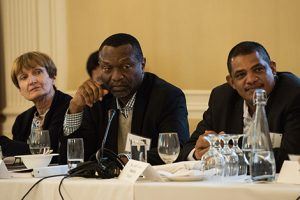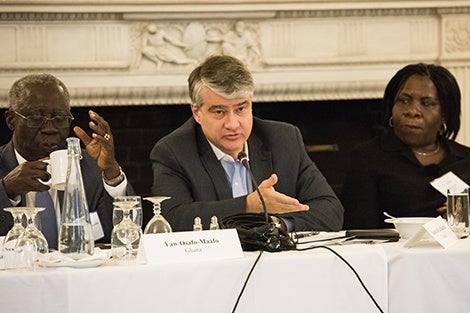May 1, 2017 – Countries with inclusive and responsive governing institutions—essentially, those that are more democratic—are also more economically successful.
That was one of the messages that 15 finance ministers from Africa and Latin America heard at the fifth annual Harvard Ministerial Leadership Forum for Finance Ministers, which took place April 23-26, 2017. Keynote speaker James Robinson, a political scientist and economist from the University of Chicago, presented overwhelming historical evidence suggesting that inclusive governance can help boost countries’ economies.
Robinson’s message resonated with the ministers participating in this year’s Forum, many of whom are from countries with predominantly youthful populations that are growing increasingly restive as they seek more inclusive and equitable institutional systems and more opportunities for economic advancement.
“We are balancing the pressure of expectations among our people with the capacity of our economy to create jobs,” said Yinager Belay, Minister of National Planning from Ethiopia.

The Ministerial Leadership Forum for Finance Ministers is held every spring as part of the Harvard Ministerial Leadership Program, a joint initiative of Harvard T.H. Chan School of Public Health, Harvard Kennedy School, and Harvard Graduate School of Education. The program also convenes annual forums each year for health ministers and education ministers. The program’s overall goal is to stimulate transformative vision, enhance leadership effectiveness and political acumen, and develop planning and execution capacity among ministers from Africa, Southeast Asia, and Latin America, who are invited to the program based on demonstrated leadership in their home countries.
Ninety-four ministers from 53 countries have participated in the program since its inception in 2012.
The four-day event focused on ways for finance ministers to collaborate with other ministers in their countries to promote a shared vision for economic development, bolstered by investments in health and education.
Boima Kamara, Minister of Finance and Development Planning from Liberia, said the forum helped transform how he views his role. “I understand that I can use my influence to convene coalitions with other sectoral ministers to advance social sector priorities and strengthen performance,” he said.
The finance ministers heard from experts from the three Harvard Schools and other academic institutions, from experienced current and former ministers from around the globe, and from representatives from financing institutions and foundations. Topics included budget decision-making, sustainable financing for universal health coverage, public-private partnerships, and revenue and cost-cutting opportunities.
Harvard Chan participants in the Forum included Dean Michelle Williams; David Bloom, Clarence James Gable Professor of Economics and Demography; William Hsiao, K.T. Li Research Professor of Economics; Winnie Yip, professor of the practice of international health policy and economics; Rifat Atun, professor of global health systems; and John Quelch, professor of health policy and management at Harvard Chan and Charles Edward Wilson Professor of Business Administration at Harvard Business School.
Said Williams, “I have watched this important three-school collaboration mature over the past six years into a truly impressive initiative. More than 90 ministers have participated in the program since its inception, and they consistently attest to its impact and value in helping them become more effective ministers and leaders of significant institutional transformation in their home countries.”
photos: Hannah McGrath
